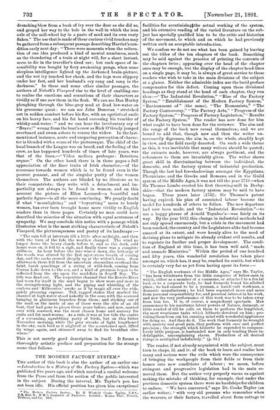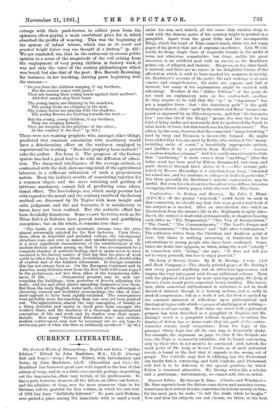THE MODERN FACTORY SYSTEM.*
THE author of this book is also the author of an earlier one —Introduction to a History of the Factory System—which was published five years ago, and which received a cordial welcome from the Press and from the section of the public interested in the subject. During the interval, Mr. Taylor's pen has not been idle. His official position has given him exceptional • The Modern Factory System. By R Whately Cooke Taylor, F.S.P.. P.B. Hist. 8.. H M.'s Inspector of Factories. London : Kegan Pan', Trench, TrOlner, and Co. 1891.
facilities for scrutinisinathe actual working of the system, and his extensive reading of the varied literature on the sub- ject has specially qualified him to be the critic and historian of the movement, to which and on which he had previously written such an acceptable introduction.
We confess we do not see what has been gained by leaving out the titles of the ten chapters of the book. Something may be said against the practice of printing the contents of the chapters twice ; appearing over the head of the chapter once may be enough, but the display of the chapter head-lines on a single page, it may be, is always of great service to those readers who wish to take in the main divisions of the subject at a glance. Neither the admirable index nor the lucid preface compensates for this defect. Coming upon these divisional headings as they stand at the head of each chapter, they run thus :—" The Industrial Revolution," "Rise of the Factory System," "Establishment of the Modern Factory System," " Environment of " (the same), " The Economists," " The Factory Controversy," " The Factory Acts," " Progress of the Factory System," " Progress of Factory Legislation," " Results of the Factory System." The reader has now done for him what ought to have been done for the reviewer. The aim and the range of the book now reveal themselves ; and we are bound to add that, though now and then the writer un- necessarily digresses, the aim is, on the whole, steadily kept in view, and the field rarely deserted. On such a wide theme as this, it was inevitable that many writers should be quoted; the extracts made, however, are always pertinent, and the references to them are invariably given. The writer shows great skill in discriminating between the individual, the domestic, and the factory system of industrial production. Though the last had foreshadowings amongst the Egyptians, Phoenicians, and the Greeks and Romans, and in the Guild system of the Middle Ages, it was not till the year 1719—when Sir Thomas Lombe erected his first throwing-mill in Derby- shire—that the modern factory system may he said to have begun. Three years later (1732), Sir Thomas's patent having expired, his plan of associated labour• became the model for hundreds of others to follow. The new departure had now been made, and the "Industrial Revolution "—to use a happy phrase of Arnold Toynbee's—was fairly on its way. By the year 1832, this change in industrial methods had not only spread enormously, but a crisis in the movement had been reached; the country and the Legislature alike had become amazed at its extent, and were keenly alive to the need of devising plans to mitigate its already evident evil results, and to regulate its further and proper development. The condi- tion of England at this time, it has been well said, " made and unmade Ministries." Within the period of one hundred and fifty years, this wonderful revolution has taken place amongst us, which has, it may be, reached its zenith, but which is certainly very far as yet from having spent its force :—
" The English workman of the Middle Ages," says Mr. Taylor, "has been withdrawn from the little congeries of fellow-men in which, either as a member of a commune, or attached to a feuial lord, or to a corporate body, he had formerly found his allotted place ; he had ceased to be. a yeoman, a handi :raft workman, a domestic manufacturer ; he had been separated more and more from personal responsibility for, and personal interest in his work, and now the very performance of this work was to be taken away from him too. It is, of course, a magnificent spectacle. Man summonses to his assistance latent powers of Nature, dormant, or little availed of till he calls on them to perform the lengthiest, the most wearisome tasks which hitherto devolved on him ; pro- viding them from out his cunning mind with wonderful appliances for doing so. And they do it. The work that formerly he wrought with anxiety and great pain, they perform with ease and perfect precision ; the strength which hitherto he expended to compara- tively little purpose, is husbanded now in only tending those in- defatigable, uncomplaining slaves. Production of all desired things is multiplied indefinitely." (p. 35.)
The reader, if not already acquainted with the subject, must turn to chaps. iii. and iv. of the book to learn and realise bow many and serious were the evils which were the consequence of bringing the workpeople from their fields or from their homes into new conditions of labonr ; we mean, before stringent and progressive legislation had in the main re- moved them. But the author very properly warns us against making the mistake of thinking, for example, that under the previous domestic system there were no hardships for children to endure. " We have conversed," says Dr. Cooke Taylor (an earlier writer), " with very old persons who remember when the weavers, or their factors, travelled about from cottage to cottage with their pack-horses, to collect yarn from the spinners, often paying a most exorbitant price for it, which absorbed the profits of weaving. This was the beginning of the system of infant labour, which was at its worst and greatest height before any one thought of a factory." (p. 422.) We are reminded, too, that in the endeavour to arouse public opinion to a sense of the magnitude of the evil arising from the employment of very young children in factory work, it was not only the voice of the zealous philanthropist which was heard, but also that of the poet : Mrs. Barrett Browning, for instance, in her touching, stirring poem beginning with the stanzas :— " Do you hear the children weeping, 0 my brothers, Ere the sorrow comes with years ?
They are leaning their young heads against their mothers', And that cannot stop their tears.
The young lambs are bleating in the meadows, The young birds are chirping in the nest, The young fawns are playing with the shadows, The young flowers are blowing towards the west :— But the young, young children, 0 my brothers, They are weeping bitterly ; They are weeping in the playtime of the others, In the country of the free." (p. 224.) There were not wanting prophets who, amongst other things, predicted that constant association with machinery would have a deteriorating effect on the workmen employed to superintend its working. " Has that prophecy been realised ?" asks the author. Far from it. The progress of the factory system has had a good deal to do with the diffusion of educa- tion. The sharpened intelligence of the average artisan, as contrasted with the dull, slow-moving mind of the agricultural labourer, is a sufficient refutation of such a preposterous notion. Even the indirect results of associating together for a common object, and the mere watching and guiding of intricate machinery, cannot fail of producing some educa- tional effect. The forebodings, too, which many persons had with regard to the moral and the sanitary results of the factory method, are discussed by Dr. Taylor with keen insight and calm judgment, and the sad forecasts, it is satisfactory to know, have not been realised. But the msthetic effect has been decidedly disastrous. Some recent factories, such as Sir Titus Salt's at Saltaire, have proved notable and gratifying exceptions ; but on the whole, it remains true that- " The banks of rivers and mountain streams were the sites almost universally selected for the first factories. Upon these, then, often in beautiful and secluded valleys, the uncongenial structure rose, and ever in naked and unredeemed ugliness. It is a most significant characteristic of the establishment of the modern factory system among us, that it was accompanied by a complete absence of testhetic feeling, that it seems never to have occurred to the factory master of that day that his place of work could be other than a bare, blank, brutalising edifice, devoid alike of comfort and of the faintest adornment. In foreign countries this has not always been so. On the European Continent and in America, many factories were from the first built with some regard to the picturesque, not less than other of the humanising influ-
ences of life Ornamental grounds may be seen sur- rounding the buildings ; trim parterres of flowers adjoining the walls ; and ivy and other plants spreading themselves over them. But from the early English water-mills, with all the advantage of charming scenery and healthful surroundings, the idea of orna- ment appears to have been rigidly excluded. The consequences were probably more far-reaching than has ever yet been pointed out. The appreciation, almost the very conception, of beauty as a thing desirable and useful in itself grew faint amongst the workers there, and the deadness of a thorough unspiritualised conception of life and work cast its shadow over their manu- facture. How many Technical Education Acts' and suchlike modern contrivances, may now be necessary ere we can hope to revive any part of what was thus so ruthlessly sacrificed !" (p. 86.)



















































 Previous page
Previous page